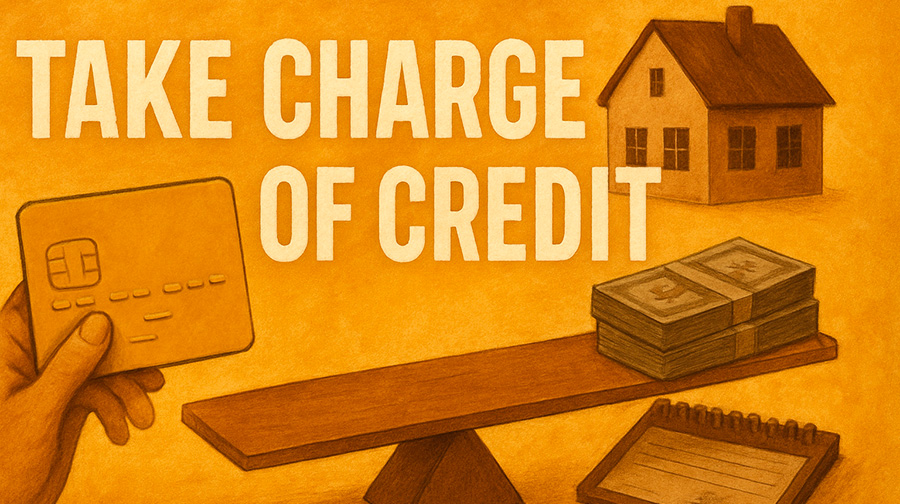
In the modern world, borrowing money has become a natural part of life. Mortgages, student loans, credit cards, and personal financing options surround us, shaping the way we buy homes, study, or handle emergencies. Yet the true challenge isn’t in getting access to credit—it’s in using it wisely. To truly take charge of credit means developing financial maturity: understanding your obligations, respecting your future, and making borrowing decisions that strengthen rather than endanger your stability. Credit isn’t the enemy; it’s a tool. The key lies in knowing how to use it with clarity and discipline.
What It Really Means to Take Responsibility for Credit
Financial responsibility begins when we realize that loans are not gifts—they are promises. Each signed agreement reflects trust between lender and borrower, built on the assumption of repayment and reliability. When you take charge of credit, you’re not simply managing debt—you’re managing reputation, opportunity, and future access to financial growth. Every decision to borrow impacts how lenders view your reliability, which in turn affects your ability to secure better terms later.
Financial maturity means asking deeper questions before taking on debt: Do I really need this loan? How will I repay it? What’s my backup plan if income drops? These questions help transform borrowing from impulse to strategy—a defining feature of financial adulthood.
The Signs of Financial Maturity
Being financially mature doesn’t mean having endless resources—it means understanding limits and making intentional choices. Individuals who demonstrate maturity in credit management tend to share certain habits and perspectives:
- They view debt as a tool, not a trap. Borrowing can create value—like buying a home or funding education—when used purposefully.
- They plan for repayment before they borrow. A good borrower always knows how future income aligns with monthly obligations.
- They monitor their credit actively. Awareness of credit reports and scores builds long-term control.
- They distinguish between wants and needs. Impulse-driven credit use often leads to stress and instability.
- They set financial goals. Borrowing fits into a broader vision of stability, not temporary convenience.
Each of these behaviors strengthens trust between the borrower and the financial system. When you take charge of credit, you show lenders, employers, and even yourself that you understand how money moves and how to keep it working for you.
The Psychological Side of Borrowing
At its core, debt involves emotion as much as numbers. Many people associate credit with guilt, fear, or shame. Others see it as freedom—a means to achieve dreams that would otherwise be out of reach. The truth lies in balance. Taking on credit responsibly can empower you, but overreliance on it can enslave you. Developing emotional awareness around money decisions helps reduce the anxiety that often leads to poor financial choices.
When you learn to take charge of credit emotionally, you stop viewing debt as a personal failure and start seeing it as a partnership. You recognize that credit requires trust, structure, and ongoing effort. This mindset leads to smarter borrowing and greater peace of mind.
Comparing Responsible vs. Reactive Borrowing
| Aspect | Responsible Borrowing | Reactive Borrowing |
|---|---|---|
| Mindset | Strategic and goal-oriented | Emotional or impulsive |
| Repayment Plan | Defined before borrowing | Considered only after debt accumulates |
| Purpose | Supports long-term growth | Satisfies short-term desires |
| Outcome | Improved financial reputation | Stress and limited borrowing options |
This comparison shows why maturity matters so much. Those who borrow with intention and structure not only experience less financial strain but also create lasting trust with banks and lenders. Over time, these relationships lead to better interest rates, higher limits, and access to more favorable opportunities.

Steps Toward Credit Responsibility
Financial responsibility can be learned. It’s not about perfection but progress—developing habits that align with stability and foresight. Here are practical steps to help you take charge of credit and establish a foundation of control and confidence.
- Know your credit score. Check it regularly and understand what affects it—late payments, utilization rates, and credit mix.
- Pay more than the minimum. Reducing principal faster lowers interest costs and builds a track record of reliability.
- Keep utilization low. Using less than 30% of your available credit signals self-discipline to lenders.
- Consolidate wisely. Combining high-interest debts can simplify management but only works if you avoid new balances.
- Communicate with creditors. If challenges arise, honesty can prevent penalties and preserve your credit standing.
By mastering these fundamentals, you turn credit from a reactive tool into a proactive one. Each responsible action helps to take charge of credit in a way that benefits both your short-term budget and long-term financial image.
Financial Trust: The Currency of Stability
Trust is the invisible currency of the financial system. When you borrow, a lender extends confidence that you’ll uphold your word. Every on-time payment strengthens that trust; every missed payment erodes it. But unlike reputation in other areas of life, credit trust is quantifiable—it’s reflected directly in your credit score.
When you consistently meet obligations, lenders respond with rewards: lower rates, flexible terms, and higher approval chances. This cycle reinforces the value of responsibility. Taking the time to understand this system and act within its rules is how individuals truly take charge of credit and build lasting financial independence.
From Overspending to Ownership
Consider Daniel, who started his career with multiple credit cards and a tendency to overspend. Within two years, he had accumulated $9,000 in debt and struggled to keep up with minimum payments. After attending a financial literacy seminar, he began tracking expenses, creating a budget, and prioritizing debt repayment. Within eighteen months, he paid off all balances, raised his credit score by over 100 points, and qualified for a low-interest car loan. By choosing awareness over avoidance, Daniel managed to take charge of credit and transform his relationship with money entirely.
How Financial Maturity Builds Long-Term Trust
| Stage | Action | Result |
|---|---|---|
| Awareness | Review credit reports and identify problem areas | Clear understanding of current standing |
| Correction | Repay debts, reduce utilization, and dispute errors | Visible score improvement and stability |
| Consistency | Maintain timely payments and monitor activity | Long-term trust with lenders |
| Growth | Leverage good credit for better terms and investment | Financial independence and resilience |
How Responsible Borrowing Shapes the Future
Credit responsibility isn’t just about current transactions—it’s about future opportunity. A healthy credit profile opens doors to entrepreneurship, home ownership, and education funding. It also reflects self-awareness and emotional maturity—traits that influence other life decisions. People who take charge of credit often demonstrate stronger planning skills, greater self-control, and a more balanced relationship with money overall.
On a societal level, responsible borrowers also contribute to financial stability. When individuals honor commitments, banks lend more confidently, interest rates stay manageable, and communities benefit from healthy economic circulation. Personal discipline, therefore, has collective impact—a reminder that credit isn’t just private; it’s part of the financial ecosystem.
Credit as a Mirror of Maturity
Credit reflects more than financial capacity—it reflects personal character. To take charge of credit means to act with foresight, integrity, and consistency. It’s not about avoiding debt entirely but about understanding how to manage it responsibly. Every decision—from paying on time to borrowing purposefully—shapes your credibility in the eyes of lenders and, more importantly, in your own self-perception. When you embrace credit as a tool for growth instead of fear, you move closer to true financial freedom. Maturity isn’t measured by how much you earn, but by how wisely you handle what you owe—and how you build trust, one payment at a time.